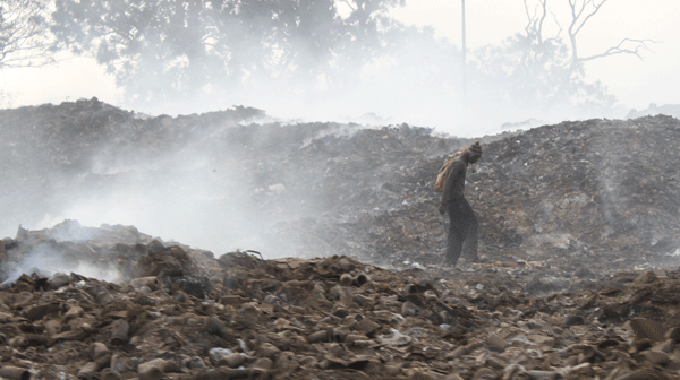Pomona waste dumpsite promotes cleaner environment

Blessings Chidakwa
Municipal Reporter
The commencement of the €304 million Pomona waste-to-energy deal will certainly give traction to the country’s efforts to ensure sustainable garbage management.
The Harare City Council recently handed over the Pomona dumpsite site to Geo Pomona Waste Management Private Limited in an investment deal to convert garbage to energy.
The project is expected to generate at least 300 jobs, while contributing to economic growth.
Geo Pomona Waste Management Private Limited is under Geogenix BV, an internationally accredited firm involved in dealing with garbage.
The management of Pomona has been a thorn in the flesh to the Harare City Council over the past decades, with pollution having become more of a habit rather than an event.
The last fire outbreak at the dumpsite lasted at least 16 days, risking the health of nearby residents who were affected by the pollution.
Failure to properly treat solid waste contributes to flooding, air pollution and public health issues such as respiratory ailments, diarrhoea and dengue fever.
Hence, the commencement of the project will result in the eradication of such pollution, leading to a smart way of waste management.
Stench is one such issue that has been a cause for concern due to the local authority’s failure to properly manage the dumpsite.
A few seconds at Pomona dumpsite was more than hell.
Thus proper waste management will help improve air and water quality as well as reduce greenhouse gas emissions.
Greenhouse gases pose severe environmental and health issues.
They cause climate change by trapping heat, which in turn affects various species in already arid climates.
Harare City Council estimates that the city generates about 1 100 tonnes of garbage daily, which is twice that of Johannesburg in South Africa. The waste is collected from all over — residential, commercial and industrial areas.
The poor and unsustainable waste management practices will definitely be a thing of the past in Harare through efforts being made to promote a cleaner environment, not only in Harare, but in all urban areas.
Harare has grappled with the waste management problem over the years, with experts having opted for its decommissioning nearly a decade ago, but with the new deal the city is headed in the right direction.
The Second Republic efforts have been making strenuous efforts to revitalise urban councils’ waste management systems.
This comes as the opposition led councils have proved a failure beyond any doubt when it comes to proper handling of garbage. Only four of Zimbabwe’s 32 urban local authorities have acceptable dumpsites for garbage disposal, with the rest in breach of 2012 regulations that prohibit the use of sub-standard landfill.
The Pomona dumpsite will actually create a huge demand for waste, thus ending the illegal dumpsites mushrooming in Harare at a worrying rate and posing serious health hazards.
Apart from an improved waste management system, the Pomona waste-to-energy deal will involve the setting up of a modern rubbish processing plant that will generate a modest 22 megawatts of electricity.
While the power generation station at Pomona will be modest, the Zimbabwe Electricity Supply Authority already has other small and medium private stations now feeding the grid or about to do so.
In waste-to-energy plants, power is generated by burning the trash at high temperatures and using it to boil water that is turned into steam, superheated, and sent to a turbine to make electricity.
Most of such plants are concentrated in Europe and Asia, with a few under construction in Africa.
These plants use strategies such as compacting garbage and sealing it to capture methane that can be used as fuel.
Geo Pomona country representative Mr Dilesh Nguwaya thanked Government for creating a conducive environment for attracting international investors into the energy sector, especially at a time power shortages were a daily challenge.
“We hope to play our part in alleviating this problem (of garbage),” he said.
Mr Nguwaya noted that the station would complement other independent power producers. He said they look forward to putting up a state-of-the-art plant, the best in the country, if not in the region.
Millions of dollars of potential revenue were being lost annually as most of the waste being generated in Harare was being carried and processed in neighbouring countries, including South Africa.
The deal was approved by Cabinet on February 14 and signed by Harare City Council and Geogenix BV on March 9.
It has since been granted National Project Status, a development that is expected to speed up its implementation.
Government is encouraging local authorities to open up similar projects in their areas as a way of ensuring environmentally-friendly management of waste.








Comments